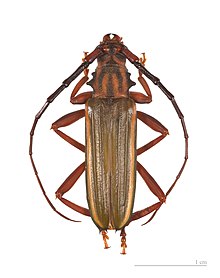| Revision as of 23:35, 28 October 2022 editBilledMammal (talk | contribs)Extended confirmed users49,325 edits →Chlorida: Add pictures← Previous edit | Revision as of 23:37, 28 October 2022 edit undoBilledMammal (talk | contribs)Extended confirmed users49,325 edits →ChloridaNext edit → | ||
| Line 18: | Line 18: | ||
| ! Image ||Species !! First described !! Range !! Synonyms | ! Image ||Species !! First described !! Range !! Synonyms | ||
| |- | |- | ||
| | ] || '']'' || ], 1844 || ], ], ] || | | ] || '']'' || ], 1844 || ], ], ] || | ||
| |- | |- | ||
| | || '']'' || Audinet-Serville, 1834 || ], ], ], ] || | | || '']'' || Audinet-Serville, 1834 || ], ], ], ] || | ||
| Line 25: | Line 25: | ||
| * ''Chlorida parvula'' <small>Thomson 1861</small> | * ''Chlorida parvula'' <small>Thomson 1861</small> | ||
| |- | |- | ||
| | ] || '']'' || Buquet, 1860 || ] || | | ] || '']'' || Buquet, 1860 || ] || | ||
| |- | |- | ||
| | || '']'' || Bates, 1870 || North western Brazil, Ecuador || | | || '']'' || Bates, 1870 || North western Brazil, Ecuador || | ||
| |- | |- | ||
| | ] || '']'' || (], 1758) || South eastern ], ], ], ] || | | ] || '']'' || (], 1758) || South eastern ], ], ], ] || | ||
| * ''Cerambyx festivus'' <small>Linnaeus, 1758</small> | * ''Cerambyx festivus'' <small>Linnaeus, 1758</small> | ||
| * ''Cerambyx spinosus'' <small>Degeer, 1775 (Preocc.)</small> | * ''Cerambyx spinosus'' <small>Degeer, 1775 (Preocc.)</small> | ||
Revision as of 23:37, 28 October 2022
Tribe of beetles
| Bothriospilini | |
|---|---|

| |
| Chlorida festiva | |
| Scientific classification | |
| Domain: | Eukaryota |
| Kingdom: | Animalia |
| Phylum: | Arthropoda |
| Class: | Insecta |
| Order: | Coleoptera |
| Family: | Cerambycidae |
| Subfamily: | Cerambycinae |
| Tribe: | Bothriospilini |
Bothriospilini is a tribe of beetles in the subfamily Cerambycinae, containing the following genera:
Bothriospila
Main article: BothriospilaThe only species in the genus Bothriospila is Bothriospila elegans. It was described by Aurivillius in 1923.
Chlorida
Main article: ChloridaThe genus Chlorida contains the following species:
| Image | Species | First described | Range | Synonyms |
|---|---|---|---|---|
 |
Chlorida cincta | Guérin-Méneville, 1844 | Mexico, Colombia, Ecuador | |
| Chlorida costata | Audinet-Serville, 1834 | Brazil, Paraguay, Argentina, Uruguay | ||
| Chlorida curta | Thomson, 1857 | French Guiana, northern central Brazil, Ecuador |
| |
 |
Chlorida denticulata | Buquet, 1860 | Guianas | |
| Chlorida fasciata | Bates, 1870 | North western Brazil, Ecuador | ||
 |
Chlorida festiva | (Linnaeus, 1758) | South eastern United States, Central America, South America, West Indies |
|
| Chlorida inexpectata | Martins, Galileo & Oliveira, 2011 | Brazil | ||
| Chlorida obliqua | Buquet, 1852 | Colombia | ||
| Chlorida spinosa | Aurivillius, 1887 | Colombia, Bolivia, Ecuador | ||
| Chlorida transversalis | Buquet in Guérin-Méneville, 1844 | Colombia |
Chrotoma
Main article: ChrotomaThe only species in the genus Chrotoma is Chrotoma dunniana. It was described by Casey in 1891.
Delemodacrys
Main article: DelemodacrysThe only species in the genus Delemodacrys is Delemodacrys mourei. It was described by Martins & Napp in 1979.
Gnaphalodes
Main article: GnaphalodesThe only species in the genus Gnaphalodes is Gnaphalodes trachyderoides. It was described by Thomson in 1860.
Knulliana
Main article: KnullianaThe only species in the genus Knulliana is Knulliana cincta, commonly known as the banded hickory borer. It was described by Drury in 1773. It is about 15–30 mm in length and occurs throughout the eastern half of North America, including Mexico and the Bahamas. If roughly handled it may start to squeak furiously. They are usually found on hickory trees and oak trees, where they lay their eggs; the larvae bore into the trees, sometimes doing significant damage.
It has three described subspecies:
- Knulliana c. cincta (Drury) - Eastern North America, Texas
- Knulliana cincta ochracea (Bates) - Southeastern United States, Northeastern Mexico, Bahamas
- Knulliana cincta sonorensis (Schaeffer) - Texas to Arizona, adjacent regions in Mexico
Ranqueles
Main article: RanquelesThe genus Ranqueles contains the following species:
| Species | First described | Range |
|---|---|---|
| Ranqueles gounellei | Bosq, 1947 | Northern central Argentina |
| Ranqueles mus | Gounelle, 1906 | North western Argentina |
| Ranqueles steparius | Di Iorio, 1996 | Neuquén Province in Argentina |
Scapanopygus
Main article: ScapanopygusThe only species in the genus Scapanopygus is Scapanopygus cinereus. It was described by Gounelle in 1913.
Taygayba
Main article: TaygaybaThe only species in the genus Taygayba is Taygayba venezuelensis. It was described by Martins and Galileo in 1998.
Timbaraba
Main article: TimbarabaThe only species in the genus Timbaraba is Timbaraba dispar. It was described by Monne and Napp in 2004.
References
- ^ Bezark, Larry G. A Photographic Catalog of the Cerambycidae of the World Archived 2013-08-27 at the Wayback Machine. Retrieved on 22 May 2012.
- "Chrotoma Genus Information". BugGuide.net. Retrieved 2018-03-04.
- "Chrotoma Report". Integrated Taxonomic Information System. Retrieved 2018-03-04.
- "Chrotoma Overview". Encyclopedia of Life. Retrieved 2018-03-04.
- "Browse Chrotoma". Catalogue of Life. Retrieved 2018-03-04.
- Monné, Miguel A. & Hovore, Frank T. (2005) Electronic Checklist of the Cerambycidae of the Western Hemisphere. PDF
| Taxon identifiers | |
|---|---|
| Bothriospilini |
|
This Cerambycinae article is a stub. You can help Misplaced Pages by expanding it. |